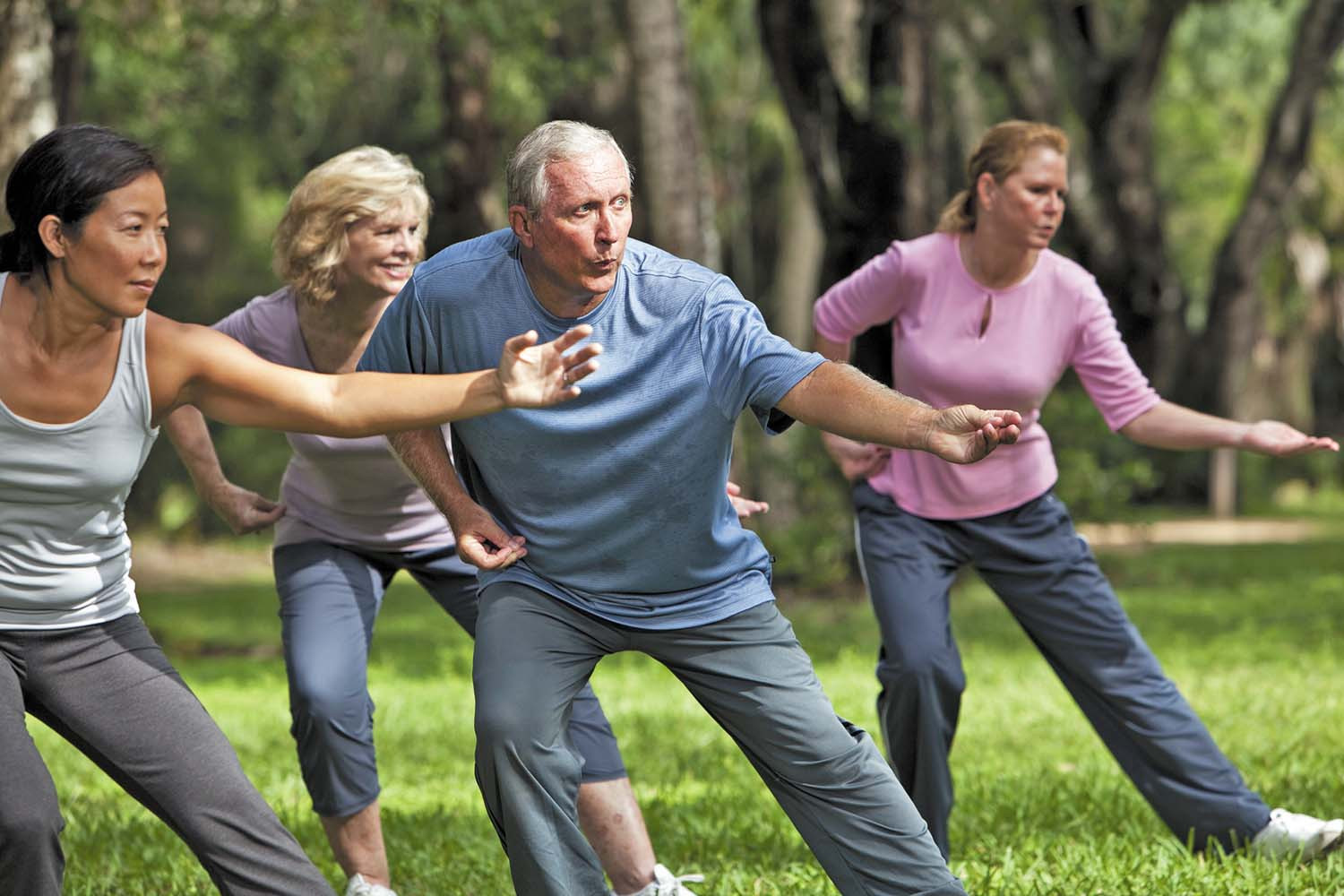This ancient Chinese practice may help lower blood pressure and offer other heart-related benefits.

Tai chi is a slow, flowing form of exercise that's sometimes described as "meditation in motion." The practice involves a series of choreographed moves with evocative descriptions, such as "grasp the sparrow's tail" or "wave hands like clouds." As your body moves, your mind has to focus. But tai chi also encourages relaxation, which helps ease stress.
Those features are all important aspects of mind-body therapies, many of which seem to benefit heart health, says Dr. Gloria Yeh, associate professor of medicine at Harvard Medical School. "On a simple level, tai chi is a very accessible form of exercise," she says. The movements are easy to adapt to different levels of intensity, and you can even do certain movements while seated in a chair. Tai chi doesn't require fully extending or stretching your joints, so it's also fine for people who are not so flexible.
A gateway exercise
Tai chi can be a good gateway exercise for people who cannot or will not engage in more conventional exercise. Even people who are out of shape can do tai chi, which can help build strength and confidence, both physically and mentally. And if you practice more vigorously or sink deeper into the poses, tai chi can provide a moderate aerobic workout.
But the meditative aspects of tai chi that teach body awareness, slowing down, and stress management are also important, says Dr. Yeh, who directs the Mind-Body Research program at Beth Israel Deaconess Medical Center. People prone to heart disease can benefit from holistic approaches that address their overall well-being, she adds.
Protecting the heart
Studies exploring the health benefits of tai chi — which also include reduced pain and improved mood — date back to the 1950s. Tai chi may help lower cholesterol levels and dampen inflammation, both of which are linked to better heart health. But the best evidence seems to be for improving blood pressure, according to a 2008 review of 26 studies co-authored by Dr. Yeh in the journal Preventive Cardiology. In people with high blood pressure, systolic blood pressure (the first number in a blood pressure reading) fell seven to 32 points, while diastolic pressure (the second number) fell by two to 18 points.
Healing the heart
Tai chi may be a promising addition to cardiac rehabilitation, a multiweek program of structured exercise paired with lifestyle and nutrition education. Cardiac rehab, which is covered by Medicare, improves quality of life and survival after a serious heart-related problem, procedure, or surgery. But according to the American Heart Association, only about a quarter of eligible Medicare recipients participate in these programs. Studies by Dr. Yeh and others suggest that for people who decline cardiac rehab, tai chi can help them ease into exercising more, losing weight, and enjoying a better quality of life. As this research continues to grow, tai chi may become a more popular option in conjunction with cardiac rehab, says Dr. Yeh. Many academic medical centers, including Harvard Medical School, have integrative medicine programs that offer tai chi classes.
Getting started with tai chi
You also can find local tai chi classes at martial arts studios, community centers, health clubs, Y's, and senior centers. Costs vary widely, ranging from about $7 to $18 for an hourlong class. Wear loose, comfortable clothing, and supportive shoes like sneakers (or no shoes, if you prefer). During the class, the instructor will demonstrate graceful, slow arm and leg movements, often done with a slight bend in the knees. "You might learn to let go of extra muscle tension, take deep breaths, and pay attention to how your body feels," says Dr. Yeh.
You can learn tai chi from a watching a DVD, which you can also use to practice at home. But going to a class has certain advantages. It may be easier to grasp the concepts with a live instructor with whom you can interact, and being in a group provides both camaraderie and motivation.
For more detailed information, check out the Harvard Medical School Special Health Report An Introduction to Tai Chi (www.health.harvard.edu/tai). The electronic version includes links to videos demonstrating the moves. World Tai Chi Day is celebrated on the last Saturday of April with free classes around the world; see www.worldtaichiday.org.
Image: © kali9/Getty Images
Subscribe to Harvard Health Online for immediate access to health news and information from Harvard Medical School.
Disclaimer:
As a service to our readers, Harvard Health Publishing provides access to our library of archived content. Please note the date of last review or update on all articles. No content on this site, regardless of date, should ever be used as a substitute for direct medical advice from your doctor or other qualified clinician.
"looking" - Google News
March 20, 2020 at 09:49PM
https://ift.tt/2U4xVef
Looking for a mellow form of exercise? Try tai chi - Harvard Health
"looking" - Google News
https://ift.tt/2tdCiJt
Shoes Man Tutorial
Pos News Update
Meme Update
Korean Entertainment News
Japan News Update
Bagikan Berita Ini














0 Response to "Looking for a mellow form of exercise? Try tai chi - Harvard Health"
Post a Comment